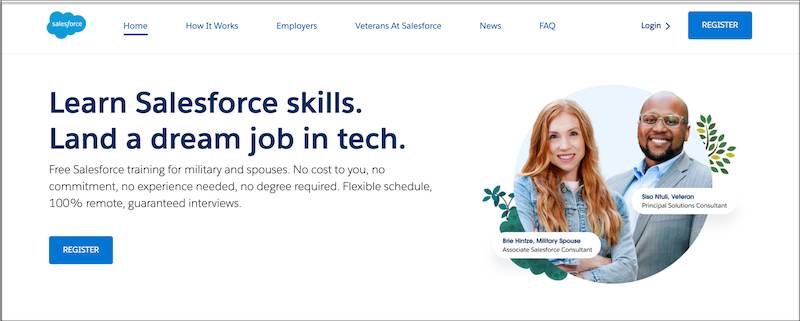Implement a Recruiting Action Plan
Learning Objectives
After completing this unit, you’ll be able to:
- Develop and implement a veteran recruiting plan.
- Describe why conversational-style interviews are best when recruiting veteran candidates.
- List some recruiting resources where you can connect with high-quality veteran talent.
Now that you’ve learned a bit about military culture and the people who have served in it, you’re probably getting excited to recruit and interview some veterans. Good news—you can start today!
Whether your focus is to learn more about the military, meet more veterans in the community, or find ways to get more veterans hired on your team, we can share a number of proven strategies that work well at Salesforce.
Create Your Own Recruiting Plan
Ready to start recruiting veterans? Here are a few ideas to kick-start your recruiting plan.
Job Requirements
Whether you’re a recruiter or a hiring manager, make sure you understand the fundamental elements of the job you're seeking to fill. This information can offer an opportunity to look at talent with military experience.
Applicant Tracking Systems
If your company has an applicant tracking system (ATS), that is another great place to find opportunities to recruit veterans. Are you looking for a managerial-level candidate? Try entering the word “commander” in your search bar. The results are likely to include a very different group of candidates than you’d normally see.
Military commanders ensured the safety, security, and effectiveness of 100 people or more. They were responsible for millions of dollars’ worth of military equipment. It was their job to keep up their team’s morale. And they took responsibility when things didn’t go as well as planned.
Go ahead and call your commander candidates and ask them to tell you about their experience. You’re likely to have a great conversation about leadership, setting expectations, performance management, and accountability.
Are you looking for someone who’s a detail-oriented problem solver? Try typing “nuclear” into your ATS search bar. It can bring up veterans who have met some of the highest technical testing standards in the military. Many of them served on a nuclear submarine. They’ve cruised at depths of more than 500 feet, and when a problem came up, they had to think quickly and accurately to solve it.
Call these candidates and ask about the most difficult problem they had to solve on their submarine. You can count on hearing stories of grace under pressure.
The Conversation Matters
Military service members have incredible stories, but often in interviews they end up fielding questions related to stereotypes. Interviewers ask them for war stories, or questions about PTSD, or for their thoughts on the current political environment in relation to the military.
Keep in mind that veterans are making the biggest career shift of their lives. Rather than asking questions based on stereotypes, which doesn’t give you much information about a candidate’s capacity to do the job, start a casual conversation. That can create space for you to learn about their background, their experiences, and their accomplishments—and how those can translate into desirable traits and attributes in the civilian world.
Here are some great tips for casual questions.
- Ask why they joined the military.
- Ask about close friends they made or relationships they established in the military.
- Ask about important lessons they learned from military service.
- Ask what the transition process to civilian life has been like.
- Ask about their experience and how it relates to the job requirements.

And don’t forget—it’s OK to stop and ask about military acronyms and terms you don’t know!
Here’s a great video from Starbucks showing the value of starting a conversation with a veteran.
Recruiting Resources
Are you still struggling to find veteran candidates? These resources may be well worth your time to attract quality applicants and build relationships in your community.
Veteran Service Organizations
Check out events hosted by veteran service organizations.
- Operation Code brings together veterans who have gone through coding bootcamps or are learning software development or programming. They provide resources and scholarships for veterans learning how to code.
- The COMMIT Foundation creates custom transition plans for high-potential veterans.
For recruiters, it’s productive to work with veteran service organizations that are actively engaged with the community, because they often focus on a specific subset of veterans that recruiters would like to reach.
Military and Veteran Career Fairs
Many military bases host career fairs for service members who are transitioning to civilian life. You can go to a base’s website and search for “family readiness” or “transition office.” For example, in the San Francisco Bay Area, Travis Air Force Base has the Airman & Family Readiness Center.
Companies such as RecruitMilitary and Military.com offer or list veteran job fairs and have resources for employers looking to recruit veterans.
Universities with active chapters of Student Veterans of America or Yellow Ribbon Programs (a financial aid program for veterans) also can serve as links between veterans and employers seeking to hire them.
Volunteer with Veteran-Oriented Organizations
Community-focused veteran service organizations like Team Red, White & Blue or Team Rubicon offer great opportunities to meet and network with veterans. Software engineers can volunteer with Operation Code and teach programming.
Veterans have rich experience and talent that can directly benefit any organization. If you are a recruiter, you get to guide the conversation and uncover those experiences. By keeping the conversation open and guiding it to reveal where experiences and job qualifications overlap, you can help surface new talent to help meet your hiring needs.
Military Recruiting Firms
Contingency recruiters and military-focused search firms may not be the first resource a company checks, but they give recruiters access to a pipeline or database of veterans who are actively seeking jobs. That can be helpful to organizations without the internal resources to conduct their own veteran-specific recruiting. They’re also helpful to any company trying to rapidly expand their veteran population.
Veteran Training Programs
Did you know that Salesforce makes a significant investment in the military community with the Trailhead Military program? Veterans and military spouses can embark on one or more learning journeys where they receive free structured, self-paced Salesforce training. They can collaborate in an online community, get Salesforce certifications, and get connected to high-demand and high-wage employment opportunities in the Salesforce ecosystem of more than 150,000 customers.

Ready to Recruit?
Now that you understand more about the unique skills and experience veterans bring to organizations, consider which of your job openings is a good place to start recruiting. Build your recruiting plan and reach out to one of the many resources available to create a pipeline of qualified candidates. Don’t forget—once you’re interviewing, have an open conversation to dive in and learn more about your candidate’s strengths and experience.
Resources
- Website: Airman & Family Readiness Center
- Website: Military.com
- Website: Operation Code
- Website: RecruitMilitary.com
- Website: Team Red, White & Blue
- Website: Team Rubicon
- Website: The COMMIT Foundation
- Website: Trailhead Military program